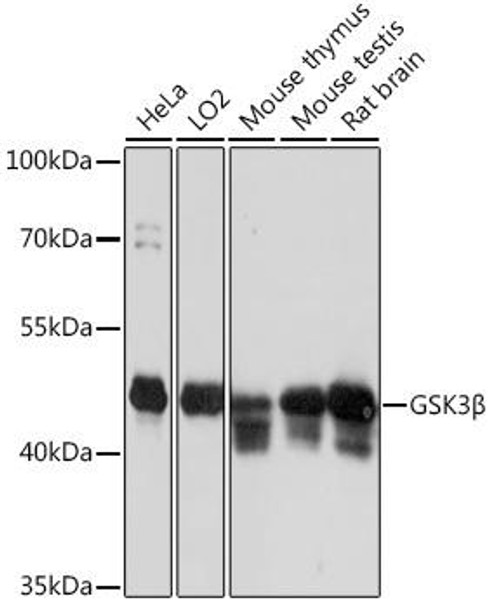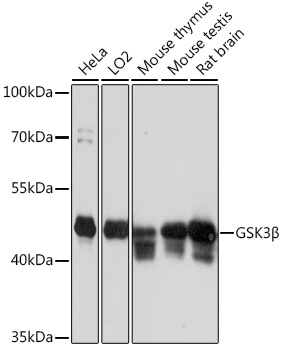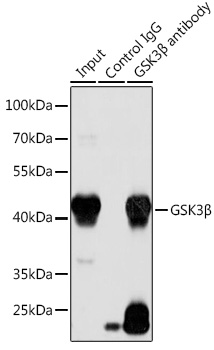Anti-GSK3Beta Antibody (CAB16868)
- SKU:
- CAB16868
- Product type:
- Antibody
- Reactivity:
- Human
- Reactivity:
- Mouse
- Reactivity:
- Rat
- Host Species:
- Rabbit
- Isotype:
- IgG
- Antibody Type:
- Polyclonal Antibody
- Research Area:
- Cell Biology
Description
| 抗体名: | Anti-GSK3Beta Antibody |
| 抗体コード: | CAB16868 |
| 抗体サイズ: | 20uL, 50uL, 100uL |
| 申し込み: | WB IP |
| 反応性: | Human, Mouse, Rat |
| 宿主種: | Rabbit |
| 免疫原: | Recombinant protein of human GSK3Beta. |
| 申し込み: | WB IP |
| 推奨希釈: | WB 1:500 - 1:2000 IP 1:50 - 1:100 |
| 反応性: | Human, Mouse, Rat |
| ポジティブサンプル: | HeLa, LO2, mouse thymus, mouse testis, rat brain |
| 免疫原: | Recombinant protein of human GSK3Beta. |
| 精製方法: | Affinity purification |
| ストレージバッファ: | Store at -20'C. Avoid freeze / thaw cycles. Buffer: PBS with 0.02% sodium azide, 50% glycerol, pH7.3. |
| アイソタイプ: | IgG |
| 順序: | Email for sequence |
| 遺伝子ID: | 2932 |
| Uniprot: | P49841 |
| セルラーロケーション: | Cell membrane, Cytoplasm, Nucleus |
| 計算された分子量: | 46kDa/48kDa |
| 観察された分子量: | 47kDa |
| 同義語: | GSK3B, gsk-3Beta |
| バックグラウンド: | The protein encoded by this gene is a serine-threonine kinase belonging to the glycogen synthase kinase subfamily. It is a negative regulator of glucose homeostasis and is involved in energy metabolism, inflammation, ER-stress, mitochondrial dysfunction, and apoptotic pathways. Defects in this gene have been associated with Parkinson disease and Alzheimer disease. |
| UniProt Protein Function: | GSK3B: a proline-directed protein kinase of the GSK family. Phosphorylates and inactivates glycogen synthase. Participates in the Wnt signaling pathway. Involved in energy metabolism, neuronal cell development, and body pattern formation |
| UniProt Protein Details: | Protein type:Protein kinase, CMGC; EC 2.7.11.26; EC 2.7.11.1; Protein kinase, Ser/Thr (non-receptor); Kinase, protein; CMGC group; GSK family; GSK subfamily Chromosomal Location of Human Ortholog: 3q13.3 Cellular Component: axon; beta-catenin destruction complex; cell soma; centrosome; cytoplasm; cytosol; dendritic shaft; dendritic spine; growth cone; lipid raft; mitochondrion; nucleus; perinuclear region of cytoplasm; plasma membrane; ribonucleoprotein complex Molecular Function:ATP binding; beta-catenin binding; integrin binding; ionotropic glutamate receptor binding; kinase activity; NF-kappaB binding; p53 binding; protein binding; protein kinase activity; protein kinase binding; protein serine/threonine kinase activity; tau protein binding; tau-protein kinase activity; ubiquitin protein ligase binding Biological Process: aging; axonogenesis; cell migration; circadian rhythm; dopamine receptor signaling pathway; epithelial to mesenchymal transition; ER overload response; establishment of cell polarity; fat cell differentiation; genetic imprinting; glycogen metabolic process; hippocampus development; myoblast fusion; negative regulation of apoptosis; negative regulation of dendrite morphogenesis; negative regulation of glycogen biosynthetic process; negative regulation of MAP kinase activity; negative regulation of neuron maturation; negative regulation of NFAT protein import into nucleus; negative regulation of nitric-oxide synthase activity; negative regulation of protein binding; negative regulation of protein complex assembly; organ morphogenesis; peptidyl-serine phosphorylation; peptidyl-threonine phosphorylation; positive regulation of axon extension; positive regulation of cell-matrix adhesion; positive regulation of GTPase activity; positive regulation of neuron apoptosis; positive regulation of peptidyl-serine phosphorylation; positive regulation of proteasomal ubiquitin-dependent protein catabolic process; positive regulation of protein binding; positive regulation of protein catabolic process; positive regulation of protein complex assembly; positive regulation of protein export from nucleus; positive regulation of smooth muscle cell proliferation; positive regulation of transcription from RNA polymerase II promoter; proteasomal ubiquitin-dependent protein catabolic process; protein amino acid autophosphorylation; protein amino acid phosphorylation; protein export from nucleus; re-entry into mitotic cell cycle; regulation of microtubule-based process; regulation of neuronal synaptic plasticity; response to activity; response to drug; response to estradiol stimulus; response to insulin stimulus; Wnt receptor signaling pathway; Wnt receptor signaling pathway through beta-catenin |
| NCBI Summary: | The protein encoded by this gene is a serine-threonine kinase, belonging to the glycogen synthase kinase subfamily. It is involved in energy metabolism, neuronal cell development, and body pattern formation. Polymorphisms in this gene have been implicated in modifying risk of Parkinson disease, and studies in mice show that overexpression of this gene may be relevant to the pathogenesis of Alzheimer disease. Alternatively spliced transcript variants encoding different isoforms have been found for this gene.[provided by RefSeq, Sep 2009] |
| UniProt Code: | P49841 |
| NCBI GenInfo Identifier: | 20455502 |
| NCBI Gene ID: | 2932 |
| NCBI Accession: | P49841.2 |
| UniProt Secondary Accession: | P49841,Q9BWH3, Q9UL47, D3DN89, |
| UniProt Related Accession: | P49841 |
| Molecular Weight: | 48,034 Da |
| NCBI Full Name: | Glycogen synthase kinase-3 beta |
| NCBI Synonym Full Names: | glycogen synthase kinase 3 beta |
| NCBI Official Symbol: | GSK3B |
| NCBI Protein Information: | glycogen synthase kinase-3 beta |
| UniProt Protein Name: | Glycogen synthase kinase-3 beta |
| UniProt Synonym Protein Names: | Serine/threonine-protein kinase GSK3B (EC:2.7.11.1) |
| Protein Family: | Glycogen synthase kinase |
| UniProt Gene Name: | GSK3B |
| UniProt Entry Name: | GSK3B_HUMAN |



